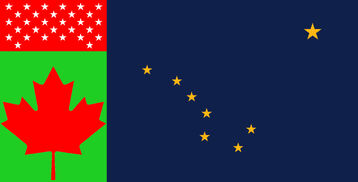Tag: Visual edit |
Tag: Visual edit |
||
| Line 16: | Line 16: | ||
Below the President is the House of Lieutenants and the House of Representatives. Members of both houses may propose legislation, but for any law to pass, it must pass via majority vote in both houses before the proposed law can be passed on to the President. The Representatives are all elected, while the Lieutenants are appointed by the member states. |
Below the President is the House of Lieutenants and the House of Representatives. Members of both houses may propose legislation, but for any law to pass, it must pass via majority vote in both houses before the proposed law can be passed on to the President. The Representatives are all elected, while the Lieutenants are appointed by the member states. |
||
| − | There are |
+ | There are 603 Representatives, each of which represent their own Congressional district (the borders of which are set by each state), with each state given the same number of Representatives as the amount of Presidential electors they receive. The Representatives are selected via a popular vote in their district, with the winning candidate being awarded the position. Balancing the Representatives are the Lieutenants, of which there are 44 members, four for each state coalition. All of the Lieutenants are appointed by the state and serve for as long as the state permits them to serve, meaning many serve for life. |
Effectively, Congress serves as solely as a place of "dispute resolution" between member states, drafting legally-binding resolutions that outline the agreement the disputers had reached, with Congress rarely enacting laws on its own. This is because Congress' powers are severely curtailed by the Constitution (backed by the Romans), which aimed to protect the sovereignty of the new states as much as possible, although Congress does have the ability to administer continent-wide functions such as the [[Interstate]] highway system. |
Effectively, Congress serves as solely as a place of "dispute resolution" between member states, drafting legally-binding resolutions that outline the agreement the disputers had reached, with Congress rarely enacting laws on its own. This is because Congress' powers are severely curtailed by the Constitution (backed by the Romans), which aimed to protect the sovereignty of the new states as much as possible, although Congress does have the ability to administer continent-wide functions such as the [[Interstate]] highway system. |
||
Revision as of 02:38, 19 March 2020

Flag of the North American Union
The North American Union (or NAU) was a political and economic union of nations located primarily in North America. It was founded on April 9, 1994 with help from the Romans and Arameans in response to the collapse of North America's dominant power, the United States of America, which created a multitude of successor states. The purpose of the Union was to ensure that the old economic, political and cultural framework of North America could be preserved as much as possible, but sovereignty disputes- both between nations and between the nations and the NAU as a whole- disparities in the wealth of member nations and the meddling of Rome and Aram in NAU affairs have meant that the NAU is still far from being a smoothly-run entity.
In 2017, following the collapse of Aram, Iceland took over in assisting Rome in administering the Union. In 2018, it was reconstituted as the Imperium Romanum Borealis ("Northern Roman Empire") under the administration of Empress Eva Avita (formerly the North American Prefect), and based in Dallas, Texas, but the rise of The Virus has limited her actual control to the Gulf Coast region.
Governance
The NAU is administered by the Union Congress, which sits in Washington, DC in what is left of the United States of America. The Congress is divided into two levels: the lower level is the House of Representatives, with the higher level being the House of Lieutenants, administered by the President.
Sitting at the top of both levels of Congress is the President, who serves as the NAU's ultimate executive and its chief administrator. The President has ultimate authority to veto any legislation passed by the lower levels of Congress, but his ability to pass laws unilaterally is restricted only to a select few functions, almost all of which pertain to "conditions of national emergency" (a measure that must be passed by Congress first).
The President is elected via the electoral college, where each member of the Union is given a certain amount of "electors". This is roughly based on each state's population, although given their status as separate signatories of the Treaty of Buffalo, Quebec and New York are given more electors. The electors' vote is determined on a state by state basis, with each state holding a direct popular vote with the winning candidate claiming their state's slate of electors. The President is elected to an eight year term, and, as bound by the North American Constitution, no President can serve a second term.The Presidential candidates come one each from registered political parties, with the two most popular parties being the Unionist Party (also known as the POP, short for "People's Official Party") and the Federalist Party. A third party, the American Party, rose during the 2016 election and will send candidates for Congress and President. Each party selects their candidate based on a state-by-state nomination process that essentially works like the electoral college, with some differences.
To be elected President, one has to be of at least 35 years of age and born in NAU territory or in a territory the Republic of Canada, the USA, the Republic of California, Deseret or Northern Mexico held on January 9, 1990, the beginning of World War III. No one currently sitting as a member of a state's government may run for President or Congress, they must resign their seat or be at the end of their terms before they can enter the primaries for both contests.
Below the President is the House of Lieutenants and the House of Representatives. Members of both houses may propose legislation, but for any law to pass, it must pass via majority vote in both houses before the proposed law can be passed on to the President. The Representatives are all elected, while the Lieutenants are appointed by the member states.
There are 603 Representatives, each of which represent their own Congressional district (the borders of which are set by each state), with each state given the same number of Representatives as the amount of Presidential electors they receive. The Representatives are selected via a popular vote in their district, with the winning candidate being awarded the position. Balancing the Representatives are the Lieutenants, of which there are 44 members, four for each state coalition. All of the Lieutenants are appointed by the state and serve for as long as the state permits them to serve, meaning many serve for life.
Effectively, Congress serves as solely as a place of "dispute resolution" between member states, drafting legally-binding resolutions that outline the agreement the disputers had reached, with Congress rarely enacting laws on its own. This is because Congress' powers are severely curtailed by the Constitution (backed by the Romans), which aimed to protect the sovereignty of the new states as much as possible, although Congress does have the ability to administer continent-wide functions such as the Interstate highway system.
Law Enforcement and Military
As per the Treaty of Buffalo, the NAU's main law enforcement body is the is the Roman Commonwealth Marquee Patrol (RCMP), affiliated with the Mundiali, who have their headquarters in Buffalo. Affiliated with the RCMP are the New York Imperial Police (NYIP) who operate in New York, and the California Bureau of Investigation, who operate in Pueblo.
The Treaty also created a united North American Army, drawn from recruits across the continent and with each of the seven state coalitions having important positions within its command structure. The Romans, though, continue to have their own troops across the continent, with the Treaty maintaining Roman primacy in all state coalitions.
State Coalitions
On October 18, 2016, the NAU Charter was revised to better reflect the Union's geopolitical reality, based on events on the ground and within the scope of the Treaty of Buffalo. Though the Union's states remained independent, each state got placed into different groups outlining which "sphere of influence" (or "coalitions") it belonged to, indicating which foreign powers (if any) were allowed to place government and military officials in their country.
For a listing of all the state coalitions, please see the List of Treaty of Buffalo countries.
History
For more information, see North American history.
The North American Union was founded on April 9, 1994 by Rome and Aram. It had a tumultuous history as regional differences meant few compromises could be reached. It eventually dissolved and became the American Confederacy in 2017 before the Icelanders (with the help of Rome) restored the Union in 2018 following the Icelandic takeover of America.
See also
- The Milner Report
- The Virus
- Juan Castro
- Emeldic people
- Irish Americans
